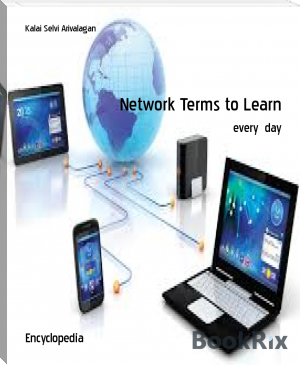Network Terms to Learn by Kalai Selvi Arivalagan (top android ebook reader TXT) 📕

Read free book «Network Terms to Learn by Kalai Selvi Arivalagan (top android ebook reader TXT) 📕» - read online or download for free at americanlibrarybooks.com
- Author: Kalai Selvi Arivalagan
Read book online «Network Terms to Learn by Kalai Selvi Arivalagan (top android ebook reader TXT) 📕». Author - Kalai Selvi Arivalagan
Bitcoin Core
Bitcoin Core is a digital successor or "reference client" of the bitcoin cryptocurrency that is now traded all over the world, though its legality varies based on jurisdiction. Bitcoin Core represents the succession from Bitcoin to Bitcoin QT and then on to Bitcoin Core. Alternately, Bitcoin Core is a separate project from various other divergent bitcoin projects developed through hard and soft forks, including Bitcoin Classic, Bitcoin Cash, Bitcoin XT, Bitcoin Unlimited and LiteCoin.
Host-Based Intrusion Detection System
A host-based intrusion detection system (HIDS) is a system that monitors a computer system on which it is installed to detect an intrusion and/or misuse, and responds by logging the activity and notifying the designated authority. A HIDS can be thought of as an agent that monitors and analyzes whether anything or anyone, whether internal or external, has circumvented the system's security policy.
Co-location
Co-location refers to the way IT equipment and resources are located or installed. This usually refers to the networking hardware resources owned by an organization, such as Web or database servers, which are located outside the vicinity of the organization's premises and "co-located" with another organization's hardware, usually an ISP or a service provider. This is usually done because the ISP might be the best candidate for maintaining the Web server hardware for the organization and it would be better to keep the hardware in a more suitable place since ISPs have specially built places for networking hardware.
Computed Axial Lithography
Computed axial lithography (CAL) is a process whereby scientists cast various projections onto a type of resin to create a three-dimensional object that is fully formed. It is inspired by the process of computed axial tomography (CAT) that uses multi-angle radiology to provide a three-dimensional model of anatomy for diagnosis.
Planned Obsolescence
Planned obsolescence is a process of expiring, depleting or withdrawing a product at a specified date or time interval. This technique is used in different organizational domains to set the decommissioning time of a hardware, software, network or Internet product or service. Planned obsolescence is also known as built-in obsolescence or predefined obsolescence.
SegWit2x
SegWit2x is a new policy proposal for the cryptocurrency bitcoin that is now under consideration in the bitcoin community. It builds on a prior protocol called Segregated Witness or SegWit. SegWit and SegWit2x can have some long-term ramifications for the use of bitcoin and related technologies in a financial process, as cryptocurrencies rival traditional national currencies.
Pixel
A pixel is the smallest unit of a digital image or graphic that can be displayed and represented on a digital display device. A pixel is the basic logical unit in digital graphics. Pixels are combined to form a complete image, video, text, or any visible thing on a computer display. A pixel is also known as a picture element (pix = picture, el = element).
Internet Privacy
Internet privacy refers to the vast range of technologies, protocols and concepts related to giving individual users or other parties more privacy protections in their use of the global Internet. Internet privacy takes many forms, including mandatory privacy statements on websites, data sharing controls, data transparency initiatives and more. Internet privacy and anonymity are paramount to users, especially as e-commerce continues to gain traction. Privacy violations and threat risks are standard considerations for any website under development. Internet privacy is also known as online privacy.
Camper
A camper is a video gamer who finds a strategic spot within a level and waits there for players, game-controlled enemies or choice items to appear. This strategy is known as camping. Camping is most popular in first-person shooter (FPS) games, but depending on the game being played, it is usually considered a form of cheating, or at least a degenerative strategy. This is because if every single player follows a camping strategy, then there won't be any possibilities for players to confront each other, leaving no game to play. Some FPS games can be customized to employ a camping strategy where entire groups are dedicated to sniper-only challenges.
Lean Production
Lean production is a systematic manufacturing method used for eliminating waste within the manufacturing system. It takes into account the waste generated from uneven workloads and overburden and then reduces them in order to increase value and reduce costs. The word "lean" in the term simply means no excess, so lean production can be translated simply into minimal waste manufacturing.
Certified Information Systems Security Professional (CISSP)
Certified Information System Security Professional (CISSP) is a vendor-neutral, independent certification offered by the International Information System Security Certification Consortium, otherwise known as (ISC)².
This globally recognized certification is designed to show an employer that a job candidate has the knowledge and experience necessary to effectively design, implement and manage an organization's cybersecurity.
Individuals seeking CISSP certification must pass a comprehensive 3-hour exam that consists of 100 to 150 questions and covers 8 broad information security domains. The eight testing domains for CISSP certification are:
Security and Risk Management
Asset Security
Security Architecture and Engineering
Communication and Network Security
Identity and Access Management (IAM)
Security Assessment and Testing
Security Operations
Software Development Security
To qualify for the CISSP exam, candidates must either have five years of security experience or four years of experience in addition to a security-related university or college degree.
If a candidate doesn’t yet have the required work experience, they have the option of taking and passing the exam to become an Associate of (ISC)². Associates are allowed six years to earn the work experience needed for full CISSP certification.
Term of the day - 12
Abstraction
Abstraction is the act of representing essential features without including the background details or explanations. In the computer science and software engineering domain, the abstraction principle is used to reduce complexity and allow efficient design and implementation of complex software systems. Some areas of software design and implementation where the abstraction principle is applied include programming languages (mainly in object-oriented programming languages), specification languages, control abstraction, data abstraction and the architecture of software systems.
Unary Operator
A unary operator, in C#, is an operator that takes a single operand in an expression or a statement. The unary operators in C# are +, -,!, ~, ++, -- and the cast operator. The signature of the declaration of a unary operator includes the operator token and the type of parameter; it does not require the return type and the name of the parameter. All the C# unary operators have predefined implementation that will be used by default in an expression. These unary operators can be overloaded in user-defined types with custom implementation by defining static member functions using the "operator" keyword.
Hashing
Hashing is generating a value or values from a string of text using a mathematical function. Hashing is one way to enable security during the process of message transmission when the message is intended for a particular recipient only. A formula generates the hash, which helps to protect the security of the transmission from unauthorized users. Hashing is also a method of sorting key values in a database table in an efficient manner.
Hash Chain
A hash chain is commonly defined as the repeated application of a cryptographic hash function to a given data asset. This type of hash cryptography can be extremely useful in some specific security setups. By providing a successive chain, hash chains make it harder for a snooping hacker to hijack a data asset through applying a single input.
Deep Neural Network
A deep neural network is a neural network with a certain level of complexity, a neural network with more than two layers. Deep neural networks use sophisticated mathematical modeling to process data in complex ways.
Deep Learning
Deep learning is a collection of algorithms used in machine learning, used to model high-level abstractions in data through the use of model architectures, which are composed of multiple nonlinear transformations. It is part of a broad family of methods used for machine learning that are based on learning representations of data.
DeepMind
DeepMind Technologies Ltd. is a firm based in the United Kingdom that works on artificial intelligence problems. DeepMind has been acquired by Google, and is now part of the Google Alphabet group.
Fast Flux DNS
A fast flux DNS strategy is where a hacker or other party registers on a domain name system in deceptive ways that prevents host server IP addresses from being identified. It is a concern for security professionals because abuse of this system can help hackers to hide from law enforcement and attack systems through a network of addresses and hosts.
Skunkworks
Skunkworks refers to advanced development projects that are sometimes top-secret (such as black projects) in technology, business and aerospace engineering. Skunkworks teams develop tasks efficiently with nominal management limitations. With direct focus on revolutionized business and technology changes, skunkworks is independent, highly secretive, innovative and well-funded.
Trunking
Trunking is a technique used in data communications transmission systems to provide many users with access to a network by sharing multiple lines or frequencies. As the name implies, the system is like a tree with one trunk and many branches. Trunking is commonly used in very-high-frequency (VHF) radio and telecommunication systems. Trunking can also be defined as a network that handles multiple signals simultaneously. The data transmitted through trunking can be audio, video, controlling signals or images. Telecommunication networks all across the globe are based on trunking. Trunking reduces the size of a telecom network and increases bandwidth. VHF radio used by police and control centers is also based on trunking.
Data-ism
Data-ism is a recently coined term for a kind of data philosophy or ideology. Various sources attribute this particular term to David Brooks, a prominent political commentator and writer at The New York Times. In comments about an overriding data philosophy, Brooks mentions data-ism as an obsession with data that assumes a number of things about data, including that it is the best overall measure of any given scenario, and that it always produces valuable results.
Parser
A parser is a compiler or interpreter component that breaks data into smaller elements for easy translation into another language. A parser takes input in the form of a sequence of tokens or program instructions and usually builds a data structure in the form of a parse tree or an abstract syntax tree.
Slimeware
Slimeware is slang term used to describe harmful adware that threatens computer security under the guise of software updates. Slimeware often automatically downloads more adware without user intervention or knowledge. This slows down the PC as resources are used by the slimeware and also exposes the user to security threats.
Network Interface Card
A Network Interface Card (NIC) is a computer hardware component that allows a computer to connect to a network. NICs may be used for both wired and wireless connections. A NIC is also known as a network interface controller (NIC), network interface controller card, expansion card, computer circuit board, network card, LAN card, network adapter or network adapter card (NAC).
Integrated Development Environment
An Integrated Development Environment (IDE) is an application that facilitates application development. In general, an IDE is a graphical user interface (GUI)-based workbench designed to aid a developer in building software applications with an integrated environment combined with all the required tools at hand.
Most common features, such as debugging, version control and data structure browsing, help a developer quickly execute actions without switching to other applications. Thus, it helps maximize productivity





Comments (0)